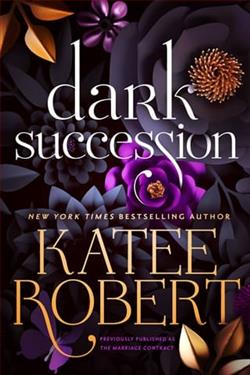Page 84 of Stardust Child
Ophele had never learned how to accept a compliment. Her usual response was to pretend it hadn’t happened.
“Well, you made me think of it,” she replied, looking down at her plate uncomfortably. “Do you have to go out again tonight?”
“Yes. It’ll be another late night, I’m afraid, so just go to bed when you get tired. But I will be home tomorrow night,” he said, briefly squeezing her hand. “It will be our last night in Tresingale, and I want everyone well-rested. We won’t get a wink once we leave, no one can sleep with the devils howling about.”
“But you have to sleep sometime,” she protested.
“I can catch a few hours in the saddle during the day,” he said, reassuring. “Lancer knows his business. He’ll warn me if there’s trouble.”
“Would he protect you from devils?” It was a romantic notion, the faithful beast defending his master.
“Probably. Warhorses are trained to protect their rider,” he said, chewing. “Maybe I should sleep near him, at that.”
“As long as you’re safe.” The words escaped before she could stop them. Ophele had an almost superstitious fear of acknowledging her fear, as if some malign influence might hear and manifest it. “You will be careful?”
“Of course. I have a powerful reason to want to come home.” His hand covered hers, big and warm and so very strong. “I think we need a holiday, little owl. Tomorrow afternoon. Would you like that?”
“Yes. Please,” she said, surprised and grateful. Even with a few days’ reprieve, it was all happening so fast, and it wasn’t enough, they hadn’t had enough time together. She had only just found the courage to hold onto him. How could she bear to let him go?
She saw him off at the front door in the soft light of evening, silently offering a prayer to the early glitters of the stars that he and Lancer would come home safe. At the bend of the road, man and horse turned in their usual farewell, and Remin’s black eyes sought hers across the distance, wordless and eloquent. Her throat tightened. There were so many ways he showed his love, and yet she had to shove down a surge of panic that had no place, no cause, no cure.
She had helped him. She had done somethingreal.It was the thing she had been trying to do all these months, and only the most paltry beginning to offsetting the crimes of her parents, but she had done it all the same.
So why were her eyes filled with tears?
* * *
There were many things Ophele had not understood, when she was young.
Aldeburke was one of them.
It was her exile and her prison, but there had never been a prison with fewer guards, or a prisoner so disregarded by her caretakers. The order of banishment restricted House Hurrell to the estate, and barred contact with all but the furthest fringe of society, so far fallen that they were willing to risk the Emperor’s wrath to associate with Lady Bette Hurrell. She had been a lady of some substance before the events of the Conspiracy and cultivated a wide correspondence even afterward: disgraced nobles, poor nobles, people who were barely nobles at all.
People of ambition.
They did not come to visit, in the beginning. For the first few years, Aldeburke was cut off entirely from the rest of the world, with the Emperor’s guards monitoring all deliveries and turning everyone else away at the gates. But those restrictions largely vanished upon the death of Lady Pavot, and by the time Ophele was nine, the first strangers had begun to come calling.
“A fosterling,” Lady Hurrell always told them, when she introduced Ophele to her company. “One of my mother’s friends left her to us, poor lamb…”
In the wake of the Imperial Army’s destruction of the east, this was completely plausible. There were many such orphans after the Conspiracy,and just as many fallen families, and so no one ever connected Lady Hurrell to Lady Pavot, and thus Ophele to the Emperor. Though Ophele had inherited her mother’s delicate features and her divine father’s rich brown hair, she had always been very small for her age, and so painfully shy that no one ever saw the stars shining in her tawny hazel eyes.
The fact that Lady Hurrell insisted on presenting her at these gatherings was another thing she didn’t understand, and one of the great trials of her young life.
“Now say hello to everyone, darling,” Lady Hurrell prodded, turning Ophele in her arms so everyone could see her small face. “You must practice your manners.”
“Hello,” Ophele whispered obediently, and hid as soon as she could.
A child did not question why Lady Hurrell was so indulgent before them, cuddling and crooning over Ophele as if she were Lady Hurrell’s own child. Nor did Ophele understand why the lady always summoned Julot to escort her away, his hand tugging impatiently as all the ladies watched and cooed.
But she did understand that there were cookies.
The year she was nine, Ophele managed to slip away from both Julot and her maids, finding her way to the east parlor, where many tables were spread with sumptuous variety. And there, she hesitated, for the room was overflowing with strangers, and all the other little girls were gravely taking their turns at playing the lute, the harp, and the clavichord.
“Oh, would you like something to eat, sweetheart?” asked a matronly lady, spying her hiding behind a potted palm. She beckoned Ophele closer. “Poor little dear. It’s a lot of strangers, isn’t it?”
Ophele nodded timidly, eying the raspberry cookies.
“I am Lady Ster Romil,” the lady said. “Lady Hurrell said you were going for your nap, and I bet you’re hungry now, aren’t you? Come, sit with me and we’ll have a nice snack…”















